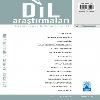CODEX CUMANICUS'TA LATİNCE ve GREKÇE ALINTILAR
Codex Cumanicus sahip olduğu sözvarlığıyla sadece Kıpçak Türkçesi için değil aynı zamanda Kumanların/Kıpçakların kültür etkileşimi gerçekleştirdikleri milletler için de son derece değerli bir eserdir. Codex Cumanicus yayımımızın ön sözünde eserin söz varlığı üzerine çalışmalarımızı sürdüreceğimizi ve bunları ilim âleminin istifadesine sunacağımızı ifade etmiştik. Bu çalışmada da eserdeki Latince ve Grekçe alıntıları tespit etmeye çalıştık. Codex Cumanicus'taki Latince ve Grekçe alıntı kelimelere bugüne kadar özel bir çalışmada temas edilmemiştir. Bu bağlamda Codex Cumanicus'un söz varlığı tekrar gözden geçirilerek metinde Latince ve Grekçeden alıntı olduğu kanaatini taşıdığımız kelimeler belirlendi. Ardından bu kelimeler daha çok metin bağlamında ve kültürel boyutlarıyla kısaca değerlendirilmeye çalışıldı. Metinde Latince ve veya Grekçe kelimeye ek olarak kayda geçirilmiş olan Türkçe veya başka bir dilden eş anlamlı karşılığı varsa bunlara da değinildi. Kelime cümle içerisinde kullanılmışsa görev bakımından da bir değerlendirmeye tabi tutuldu. Semantik bakımdan bir farklılaşma gerçekleşmişse ayrıca belirtildi.
Latin and Greek Loanwords in Codex Cumanicus
Codex Cumanicus is an invaluable monument not only for Kipchak Turkish but also for the nations in which Kumans/Kipchaks perform cultural communication. We have stated that we will continue our studies on Codex Cumanicus's pre-existing vocabulary, and that we will present it to the forefront of the scientific community with a new work. In this work we also tried to identify Latin and Greek loanwords in the text. The Latin and Greek loanwords in Codex Cumanicus have not been touched upon in any particular work. For his, Codex Cumanicus's vocabulary were re-overviewed and the words that we thought were quoted from the Latin and Greek the text were identified. Then these words were tried to be evaluated briefly in the context of texts and cultural dimensions. They were also mentioned if there is a synonym of Turkish or another language, which is added to Latin or Greek words in addition to the text. If the word was used in the sentence, it was also evaluated for duty. If a differentiation was realized in terms of semantics, it was also stated.
___
- ARGUNŞAH, Mustafa; GÜNER, Galip (2015). Codex Cumanicus, İstanbul: Kesit Yayınları (CC)
- BEEKES, Robert (2010). Etymological Dictionary of Greek, Leiden-Boston: Brill.
- BOAG, John (1848), A Popular and Complete English Dictionary: Exhibiting the Pronunciation, Etymology, and Explanation of Every Word Usually Employed in Science, Literature, and Art, Vol. II, London.
- ÇAĞBAYIR, Yaşar (2007). Ötüken Türkçe Sözlük, 1. C., İstanbul: Ötüken Yayınları.
- DEMİR, Necati (2002). "Horan Kelimesi Üzerine", TDAY-Belleten-2002, C. II, s. 25-34, Ankara: TDK Yayınları.
- DE VAAN, Michiel (2008). Etymological Dictionary of Latin and the Other Italic Languages, Leiden-Boston: Brill.
- DIAMOND, Wilfrid (2008). Dictionary of Liturgical Latin, Wipf and Stock Publishers, Eugene. Encyclopædia Britannica (1842). "Psalm", Seventh Edition, Vol. XVIII, Adam and Charles Black, Edinburg, s. 701. (EB)
- EREN, Hasan (1999). Türk Dilinin Etimoloji Sözlüğü, Ankara: Bizim Büro Basım Evi.
- GÜRKAN, Salime Leyla (2013). "Zebûr", TDV İslam Ansiklopedisi, C. 44, b. 171-173.
- KARAAĞAÇ, Günay (2015). Türkçenin Alıntılar Sözlüğü, Ankara: Akçağ Yayınları.
- MITCHELL, Leonel L., MEYERS Ruth A. (2016). Praying Shapes Believing: A Theological Commentary on the Book of Common Prayer, Seabury Books, New York.
- MORAVCSIK, Gyula (1958). Byzantinoturcica, I-II, Berlin: Akademie-Verlag.
- NEED, Stephan W. (2007). The Gospels Today: Challenging Readings of John, Mark, Luke & Matthew, Cowley Publications, Lanham.
- ÖZTEKTEN, Özkan (2009). "Her Söze Maydanoz", Türk Dili, S. 694, s. 501-509.
- SOGGIN, Alberto J. (1989). Introduction to the Old Testament, Third Edition, Kentucky: Westminster/ John Knox Press. Tarama Sözlüğü (1995), I. C., A-B, Ankara: TDK Yayınları. (TS)
- TIETZE, Andreas (1955). "Griechische Lehnwörter im anatolischen Türkisch", Oriens, Vol. 8, No. 2, s. 204-257.
- TIETZE, Andreas (2002). Tarihi ve Etimolojik Türkiye Türkçesi Lugatı, Birinci Cilt, A-E, İstanbulWien: Simurg Yayınları.
- TIETZE, Andreas (2009). Tarihi ve Etimolojik Türkiye Türkçesi Lugatı, İkinci Cilt, F-J, Verlag der Österreichischen Akademie der Wisswnschaften, Wien.
- VALPY, A. J. (1828), An Etymological Dictionary of the Latin Language, London.
- WEIGAND, Friedrich L. K. (1910), Deutsches Wörterbuch, Zweiter Band, L bis Z, Verlag von Alfred Töpelmann, Gießen.
- WEXLER, Paul (1987). Explorations in Judeo-Slavic Linguistics, Leiden: Brill.
- ISSN: 1307-7821
- Yayın Aralığı: Yılda 2 Sayı
- Başlangıç: 2007
- Yayıncı: Avrasya Yazarlar Birliği
Sayıdaki Diğer Makaleler
DİL FELSEFESİ AÇISINDAN DESTANLARDA "YABANCI" VE "DÜŞMAN" OLGUSU: YAKUT DESTANI ÜZERİNE BİR DENEME*
SARİKOLİ-TÜRKÇE DİL İLİŞKİLERİ VE SARİKOLİ DİLİNDEKİ KOPYALANMIŞ TÜRKÇE KODLAR
TÜRKİYE TÜRKÇESİNDE BİR EDATLAŞMA ÖRNEĞİ OLARAK "adına"
GÜNLÜK ASTROLOJİ YAZILARINDA ZAMAN VE KİPLİK ANLAMLAR
"ZAMİR N'SİNİN KAYNAĞI OLARAK NAZAL ÜNLÜ" SÖYLEMİ
TÜRK KAĞANLIĞI VE TÜRK BENGÜ TAŞLARI
ÖZBEK TÜRKÇESİ AĞIZLARI ÜZERİNE BİR DEĞERLENDİRME
